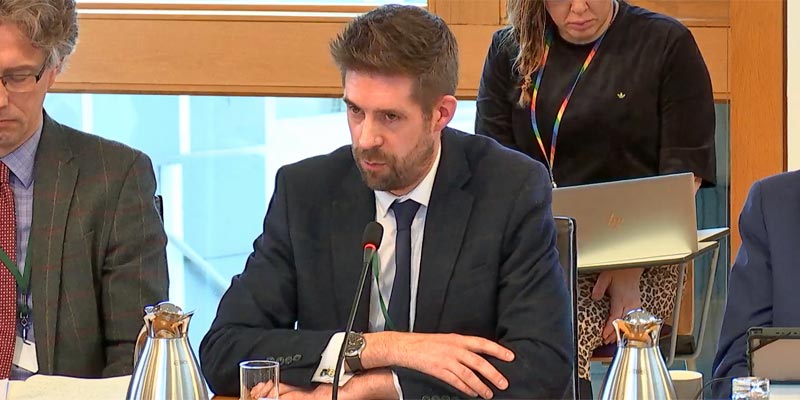"Food production not an optional extra" AIC Scotland tells MSPs at Committee roundtable

Agri-supply industry views on future agriculture policy were made clear to politicians at the Scottish Parliament on Wednesday (22 February).
AIC Scotland Policy Manager Ian Muirhead represented Member businesses at an industry roundtable convened by the Rural Affairs and Islands Committee at Holyrood in Edinburgh.
The evidence heard by MSPs from a range of stakeholders will help shape the scrutiny of future agriculture policy, with the Agriculture Bill expected to be brought forward by the Scottish Government this summer.
Stakeholders giving evidence alongside AIC Scotland included the Scottish Tenant Farmers Association, Scottish Crofters Association and British Veterinary Association.
Food security shock
Committee members heard that while AIC Scotland welcomed further detail on the Bill, there is a need for the legislative framework to have "sufficient flexibility for unforeseen circumstances", as evidenced by the war in Ukraine. Ian emphasised that the conflict has "massively changed how people think about food and domestic agriculture".
Highlighting the array of challenges that the industry faces, he explained that one year on from Russia's invasion of Ukraine the impacts on the global supply chain continue to be felt.
"Those events highlighted the necessity and importance of investing in our domestic agriculture industry from a food security perspective, but also alongside the many other goals and measures which future policy seeks to address," he said.
"Food production is no longer an optional extra when we talk about agri-policy - it must be central to policy considerations going forward."
Challenges and opportunities
On plant breeding techniques, Ian said gene-editing was one of the essential tools for producing food in an increasingly extreme and adverse climate, especially given diminishing access to plant protection products and rising pest and disease pressures.
He added that more work needed to be done to better inform policy makers and stakeholders on the fundamental differences between this precision breeding technology and genetically modified crops.
"The whole supply chain needs to have access to new and emerging technologies that can help them meet a lot of the policy objectives that are going to be set, in terms of sustainability and reducing emissions.
"It's a necessity and we do need to have these tools in the toolbox to allow Scottish agriculture to flourish," he said, pointing to the difficulties caused by regulatory divergence on this issue between the UK and Scottish Governments.
Discussing direct payments for Scottish farmers, Ian urged "evolution rather than revolution" of the system directing money to productive farming, "which in the short- and medium-term can give stability to the industry and make sure support gets to where it needs to go, while also developing outcome- and action-based strings which are attached to those payments."
He also cautioned talk of a new software system to deliver the payments, stressing that significant concerns on its cost and reliability would risk creating cashflow issues for farmers which may impact the entire supply chain.
Sustainability credentials
Among other challenges explored was distillery by-products going to anaerobic digestion plants instead of being used for animal feed.
Ian explained that this has meant the loss of a locally produced, sustainable source of protein for animal feed, leading to increased costs for feed producers which are vying for raw materials. He flagged the threat this issue poses to the livestock sector's sustainability credentials as a result.
Watch the video of the Committee session below.




